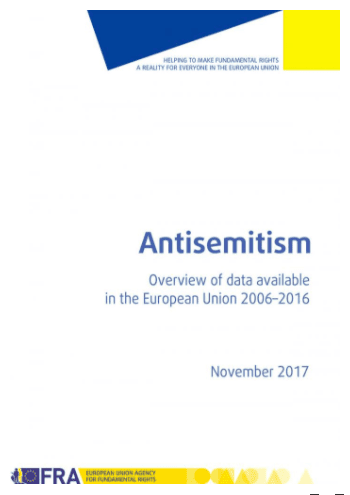

New extremely important report recently published by the EU Agency for Fundamental rights.
This report provides an overview of data on antisemitism as recorded by international organisations and by official and unofficial sources in the 28 European Union (EU) Member States, based on their own definitions and categorisations.
Antisemitism can be expressed in the form of verbal and physical attacks, threats, harassment, property damage and graffiti or other forms of speech or text, including on the internet. Antisemitic incidents and hate crime violate fundamental rights, including the right to human dignity, the right to equality of treatment and the freedom of thought, conscience and religion.
This annual overview compiles the available evidence on antisemitic incidents collected by governmental and non-governmental sources, covering the period 1 January 2006– 31 December 2016, where data are available. In addition, it includes a section that presents evidence from international organisations. No official data on reported antisemitic incidents in 2016 were available for 11 Member States by the time this report was compiled in September 2017.
‘Official data’ are understood here as those collected by law enforcement agencies, other authorities that are part of criminal justice systems and relevant state ministries at the national level. ‘Unofficial data’ refers to data collected by civil society organisations.
for the full report click HERE

UNESCO and the Organization for Security and Co-operation in Europe’s Office for Democratic Institutions and Human Rights (OSCE-ODIHR) are publishing new resources for teacher trainers, titled Addressing Anti-Semitism in Schools: Training Curricula. Launched online on 24 November (5pm CET), the publication responds to an alarming rise in anti-Semitism, which is threatening the security of Jewish communities and individuals around the world.
The publication reflects the view that education plays a crucial role in raising young people’s awareness of anti-Semitism and helps them resist the harmful messages of hate speech. In 2019 alone, anti-Semitic hate crimes increased by 13% in Germany and 14% in the United States, for example. In 2020, the COVID-19 pandemic spurred a new wave of anti-Semitic conspiracy theories, while studies in the United States and Europe show a marked increase in Holocaust denial and distortion, both on- and off-line.
Supporting educators in particular, UNESCO and the Organization for Security and Co-operation in Europe (OSCE) Office for Democratic Institutions and Human Rights (ODIHR) are publishing new resources for teacher trainers, titled ‘Addressing Anti-Semitism in Schools: Training Curricula’. The publication will be launched online on 24 November at 17.00 CET.
Recognizing that schools are not immune to messages and acts of hate, UNESCO and ODIHR’s new publication prepares teachers and school directors to resist anti-Semitism through education and to address it when it arises in an educational environment. Divided into four distinct volumes, the publication includes targeted curricula for trainers of teachers in primary, secondary and vocational education, as well as school directors. The resources were developed with the support of the University College London Centre for Holocaust Education, as part of ODIHR’s Turning Words into Action to Address anti-Semitism project and within the framework of UNESCO’s programme on Global Citizenship Education.
The curricula follow a human rights-based approach and provide pedagogical knowledge and concrete activities, designed to strengthening learners’ critical thinking, understanding, and rejection, of anti-Semitism, prejudice and discrimination. Each volume includes a comprehensive list of good practices as well as examples of scenarios and methodological suggestions. Adding to the publication, the USC Shoah Foundation UNESCO Chair on Genocide Education is developing a website that will link the curricula to existing online teaching resources.
The new publication is based on UNESCO and ODIHR’s 2018 guidelines for policymakers on Addressing anti-Semitism through Education. In 2019, the guidelines informed a series of capacity-building workshops, which reached policymakers from more than 60 countries.
The online launch on 24 November will feature statements by Katarzyna Gardapkhadze, Officer-in-Charge of ODIHR, Stefania Giannini, UNESCO Assistant Director General for Education, and German Ambassador Michaela Küchler, who holds the International Holocaust Remembrance Alliance Chair. A panel discussion will focus on The role of education in addressing antisemitism with the participation of Maram Stern, Executive Vice President of the World Jewish Congress, Sharon Nazarian, Senior Vice President of International Affairs at the Anti-Defamation League (ADL), Stuart Foster, Executive Director of the University College London Centre for Holocaust Education. It will be moderated by Stephen Smith, Executive Director of the USC Shoah Foundation and UNESCO Chair for Genocide Education. The framework curricula will be introduced by Ruth-Anne Lenga, Programme Director, and Arthur Chapman, Associate Professor in History Education of the University College London Centre for Holocaust Education.
The article was published in MirageNews

Basel – Two young men are said to have torn down an Israel flag at the Basel synagogue and then burned it.
The alleged perpetrators were arrested by the Basel police.
The Jewish Community of Basel (IGB) confirmed the incident to the Swiss news agency Keystone-SDA.
There are camera recordings that show one of the two alleged perpetrators climbing over the fence and taking the flag with him. This was later found set on fire.
The IGB has filed a criminal complaint.
Switzerland – Israel flag set on fire in front of a synagogue in Basel
It’s a challenging time for Jewish communities in Europe. Anti-Semitism is on the rise as populism and the politics of the lowest common denominator are gaining traction. Our communities often need round the clock protection and our practices and customs such as keeping Kosher are under pressure from increasing political interference.
| Cookie | Duration | Description |
|---|---|---|
| cookielawinfo-checkbox-analytics | 11 months | This cookie is set by GDPR Cookie Consent plugin. The cookie is used to store the user consent for the cookies in the category "Analytics". |
| cookielawinfo-checkbox-functional | 11 months | The cookie is set by GDPR cookie consent to record the user consent for the cookies in the category "Functional". |
| cookielawinfo-checkbox-necessary | 11 months | This cookie is set by GDPR Cookie Consent plugin. The cookies is used to store the user consent for the cookies in the category "Necessary". |
| cookielawinfo-checkbox-others | 11 months | This cookie is set by GDPR Cookie Consent plugin. The cookie is used to store the user consent for the cookies in the category "Other. |
| cookielawinfo-checkbox-performance | 11 months | This cookie is set by GDPR Cookie Consent plugin. The cookie is used to store the user consent for the cookies in the category "Performance". |
| viewed_cookie_policy | 11 months | The cookie is set by the GDPR Cookie Consent plugin and is used to store whether or not user has consented to the use of cookies. It does not store any personal data. |